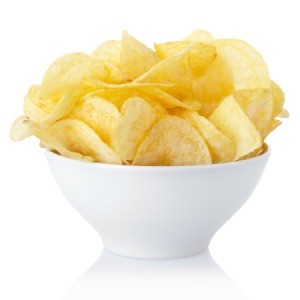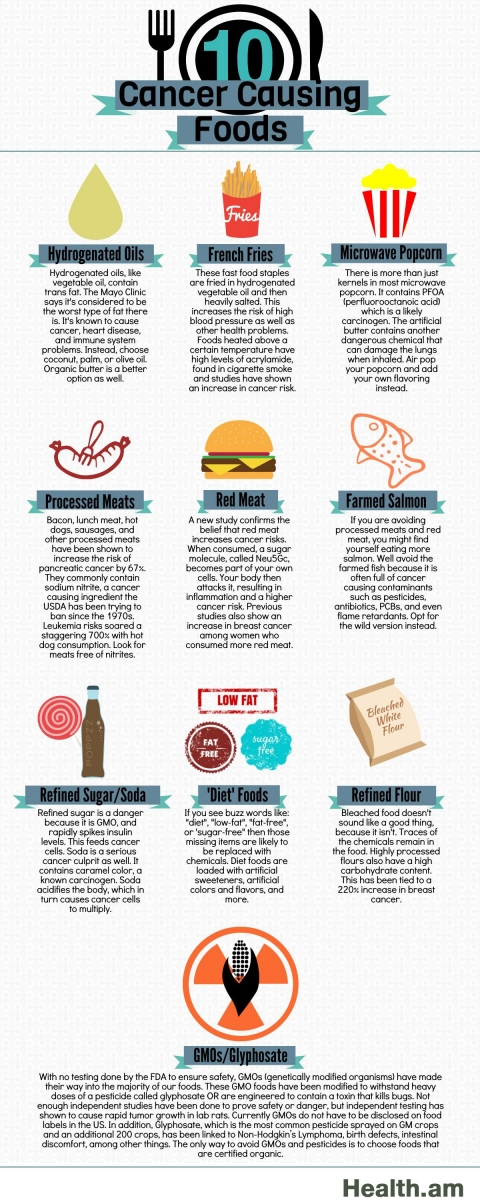Top 13 most unhealthy, cancer-causing foods
5. Refined Sugar: The biggest threat is high-fructose corn syrup (HFCS) but even brown sugar is highly refined white sugar with some of the removed molasses added back in for flavor and color. They are the source of major insulin spikes and feed the growth of cancer cells. Since the majority of the sugar supply in the U.S. is made using genetically modified (GMO) sugar beets, a healthier option is organic honey, coconut sugar, or maple sugar.
Artificial Sweeteners and Cancer
Is there an association between artificial sweeteners and cancer?
 Questions about artificial sweeteners and cancer arose when early studies showed that cyclamate in combination with saccharin caused bladder cancer in laboratory animals. However, results from subsequent carcinogenicity studies (studies that examine whether a substance can cause cancer) of these sweeteners have not provided clear evidence of an association with cancer in humans. Similarly, studies of other FDA-approved sweeteners have not demonstrated clear evidence of an association with cancer in humans.
Questions about artificial sweeteners and cancer arose when early studies showed that cyclamate in combination with saccharin caused bladder cancer in laboratory animals. However, results from subsequent carcinogenicity studies (studies that examine whether a substance can cause cancer) of these sweeteners have not provided clear evidence of an association with cancer in humans. Similarly, studies of other FDA-approved sweeteners have not demonstrated clear evidence of an association with cancer in humans.
What have studies shown about a possible association between specific artificial sweeteners and cancer?
Saccharin
Studies in laboratory rats during the early 1970s linked saccharin with the development of bladder cancer. For this reason, Congress mandated that further studies of saccharin be performed and required that all food containing saccharin bear the following warning label: “Use of this product may be hazardous to your health. This product contains saccharin, which has been determined to cause cancer in laboratory animals.”
Subsequent studies in rats showed an increased incidence of urinary bladder cancer at high doses of saccharin, especially in male rats. However, mechanistic studies (studies that examine how a substance works in the body) have shown that these results apply only to rats. Human epidemiology studies (studies of patterns, causes, and control of diseases in groups of people) have shown no consistent evidence that saccharin is associated with bladder cancer incidence.
Because the bladder tumors seen in rats are due to a mechanism not relevant to humans and because there is no clear evidence that saccharin causes cancer in humans, saccharin was delisted in 2000 from the U.S. National Toxicology Program’s Report on Carcinogens, where it had been listed since 1981 as a substance reasonably anticipated to be a human carcinogen (a substance known to cause cancer).
 6. Salted, Pickled, and Smoked Foods: These products typically contain preservatives, such as nitrates, which are intended to prolong shelf life. The additives used in processed foods can accumulate in your body over time. Eventually, such toxins cause damage at the cellular level and lead to diseases like cancer. When smoked foods are cooked at high temperatures, the nitrates are converted to the much more dangerous nitrites.
6. Salted, Pickled, and Smoked Foods: These products typically contain preservatives, such as nitrates, which are intended to prolong shelf life. The additives used in processed foods can accumulate in your body over time. Eventually, such toxins cause damage at the cellular level and lead to diseases like cancer. When smoked foods are cooked at high temperatures, the nitrates are converted to the much more dangerous nitrites.
7. Soda and Carbonated Beverages: Sodas have been at the center of the health debate for two decades. Filled with high-fructose corn syrup (HFCS), dyes, and a host of other chemicals, they are very bad for your health. They provide zero nutritional value and can rob your body of the nutrients you get from other foods. Adding “diet” to the label means you’re also consuming aspartame - and that is no better than rat poison.
 8. White Flour: When flour is refined, all nutritional value is removed and then it is bleached with chlorine gas to make it more appealing to consumers. The glycemic index for white flour is very high - meaning it spikes your insulin levels without providing nutritional fuel. Carbohydrates are converted to sugars by your body, so excessive products that contain white flour can lead to increased insulin resistance.
8. White Flour: When flour is refined, all nutritional value is removed and then it is bleached with chlorine gas to make it more appealing to consumers. The glycemic index for white flour is very high - meaning it spikes your insulin levels without providing nutritional fuel. Carbohydrates are converted to sugars by your body, so excessive products that contain white flour can lead to increased insulin resistance.
9. Farmed Fish: Commercial fish farming involves raising an incredible number of fish - such as salmon - in a crowded environment. 60% of the salmon consumed come from a farming operation where they are treated with antibiotics, pesticides, and other carcinogenic chemicals. They also do not contain as much omega-3 as wild salmon.
 10. Hydrogenated Oils: Vegetable oils are chemically extracted from their source, then they are chemically treated, and then more chemicals are added to change the smell and taste. They are packed with unhealthy omega-6 fats and have been proven to alter the structure of our cell membranes.
10. Hydrogenated Oils: Vegetable oils are chemically extracted from their source, then they are chemically treated, and then more chemicals are added to change the smell and taste. They are packed with unhealthy omega-6 fats and have been proven to alter the structure of our cell membranes.
 11. Potato chips: They may be cheap, easy and delicious, but these crispy, addicting snacks can also be deadly. These fatty foods don’t only cause weight gain because of their high trans-fat content, they also have excessive sodium levels, which cause high blood pressure and artificial flavors, preservatives and colors. Another risk is the presence of acrymalide, a known carcinogen found in cigarettes. Try not to feed these quick snacks to yourself or your kids and choose pretzels, air-popped popcorn or baked apple chips instead.
11. Potato chips: They may be cheap, easy and delicious, but these crispy, addicting snacks can also be deadly. These fatty foods don’t only cause weight gain because of their high trans-fat content, they also have excessive sodium levels, which cause high blood pressure and artificial flavors, preservatives and colors. Another risk is the presence of acrymalide, a known carcinogen found in cigarettes. Try not to feed these quick snacks to yourself or your kids and choose pretzels, air-popped popcorn or baked apple chips instead.
12. ANYTHING “diet”: You may be thinking you’re doing the right thing when choosing a food with a “diet” or “low-fat” label, but you’re actually doing way more harm than good. Chemical artificial sweetener aspartame, again, is the big culprit, causing cancer, birth defects and heart problems. Think about it - anything “diet” is chemically processed and not REAL food. These foods also contain additives like ones found in cocaine to make you feel good, but also be addicting. Be smart and eat nature’s delicious, natural foods - organic only, of course!
Any food that is listed as “diet,” “light,” or “fat-free” should be avoided. In order to remove fat or natural calories, they are replaced with chemicals that are dangerous to your body. Instead of eating food that manufacturers profess is “good for you” - add organic fruits and vegetables, grass-fed meats, and organic dairy products.
 13. Alcohol: Alcohol use is the second leading cause of cancer, right behind tobacco use. While a moderate or low consumption of alcohol can be healthy and lead to a reduced risk of heart disease, excessive drinking is known to cause heart failure, stroke, and sudden death. Excessive alcohol use is the biggest cause of mouth, esophagus, liver, colon, mouth, rectum and breast cancers. Don’t worry! You don’t need to give up your glass of wine with dinner, but, for your health’s sake, stick to one.
13. Alcohol: Alcohol use is the second leading cause of cancer, right behind tobacco use. While a moderate or low consumption of alcohol can be healthy and lead to a reduced risk of heart disease, excessive drinking is known to cause heart failure, stroke, and sudden death. Excessive alcohol use is the biggest cause of mouth, esophagus, liver, colon, mouth, rectum and breast cancers. Don’t worry! You don’t need to give up your glass of wine with dinner, but, for your health’s sake, stick to one.
Alcohol and cancer
We now know that alcohol can increase your risk of a number of cancers. A review in 2011 by Cancer Research UK suggests that around 4 out of 100 cancers (4%) are linked to alcohol. It increases the risk of mouth cancer, liver cancer, breast cancer, bowel cancer, and throat cancer, which includes pharyngeal cancer, laryngeal cancer and cancer of the food pipe (oesophagus).
Even moderate alcohol intake increases your risk of cancer. A recent UK study showed that women who drink 1 or 2 drinks a day have a slightly increased risk of cancer.
Small changes will change how you feel (and look) from the inside out. Now that you know what the top cancer causing foods are, isn’t it about time to choose healthy food ingredients?
####
Jonathan Benson, staff writer
